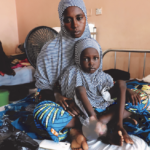Two Members of Vulnerable Group Surmount Suicidal Ideation
A GF NAHI SUCCESS STORY
Suicidal Ideation, also called suicidal thoughts or ideas is a broad term used to describe a range of contemplations, wishes, and preoccupations with death and suicide.
Friday is a 28-year-old male secondary school leaver working as security personnel in Benin City, Edo State. He had relocated from a rural community in Benue State about a year prior to presentation. Friday is single but had a longstanding 5-year-old relationship in Benue State.
In March 2021, one of the People who Injects Drugs (PWID) Community Facilitators met Friday at the bunk, where he complained of fever and general feeling of unwellness. He was tested there at the community for HIV and the result came back positive. This prompted his referral to the Excellence Community Education Welfare Scheme (ECEWS)-managed operational support system (OSS) facility for a re-test and confirmation.
Friday had emotional meltdown at the OSS after the confirmatory test and he was referred from the Testing and Counselling unit to see the Psychologist. At presentation, he had a gloomy appearance, low mood and was angry because of his new diagnosis.
He verbalized the anger he felt towards his girlfriend of 5 years, whom he believed had infected him. Friday and his girlfriend were living apart in different states, and she had visited him four (4) months prior to the test date. He said he was planning to go with a gun to the lady’s place where he would kill her and then kill himself.
In Friday’s words “to kill myself go better pass to live with sickness, then spread am give everybody. Because if I do am that one go be sin [I prefer killing myself to living with this virus, and infecting every lady I sleep with, because it would be a sin]”.
In addition, Friday was beginning to feel guilty that he might have infected a lady he slept with the previous week. The lady in question was an unmarried breastfeeding mother of a 6-month-old baby. The thought that the baby could have also been exposed compounded his feelings of guilt. Further assessment using the Becks Suicidal Ideation Scale (BSIS) indicated a high suicide risk score, which necessitated active psychological intervention.
The major psychological Intervention provided to Friday was psychoeducation. This entailed a systematic, structured, and didactic knowledge transfer on HIV and its treatment (antiretroviral therapy), integrating emotional and motivational aspects to enable him cope with living with the virus and improve his treatment adherence and efficacy. It is an intervention that encompasses a broad range of activities that combine education, counselling, and supportive measures. The follow-up plan was a daily telephone and WhatsApp communication that lasted a week, and then weekly sessions for 8 weeks. He was also encouraged to bring in his new sexual partner for HIV testing services.
After the first session, he decided life is not that hard and was willing to give this new life a trial. He commenced his Anti-Retroviral Therapy (ART) same day and a week later brought in the lady for testing, she tested negative to HIV. Two months into treatment during a support group meeting, Friday shared his story with his peers, the story of his initial struggle to accept his HIV status, the suicidal ideation he experienced and how that had changed. Today, he is a happier young man, always full of smiles and occasionally making random calls to any of his care providers in the OSS to express his gratitude.
It has been one year on the treatment and Friday had never defaulted in his medication intake and clinic appointments. His viral load test has been done, and he is virally suppressed.
Also, in one his visits to the facility, he hinted the team on plans to relocate to another state towards mid-year. He made enquiry about availability of a treatment center in the city he would be residing and requested for a proper transfer arrangement to be done when it is time for him to leave. This reflects his understanding of the importance of continuity on ART and a commitment to healthy living. Furthermore, he decided to marry his new partner and adopt her son.
Friday’s story underscores the need to integrate mental health and psychosocial support in the care and management of people living with HIV.
HIV-positive clients achieve improved cognitive reappraisal and ART retention
Joseph’s world seemed to have hit the rocks when a confirmatory HIV test, he took at the Global Fund supported OSS facility managed by ECEWS in Edo came back positive. Joseph is the first son of his mother. He is from a very large but prominent polygamous family that competes among themselves for success and status quo in the society.
Prior to the knowledge of his HIV status, Joseph’s medical history revealed that he had survived major health challenges from his childhood to adulthood, including kidney stones, Thyrotoxicosis, gastric ulcer, sleep apnea, and glaucoma plus multiple events of road traffic accident. Joseph had also recently lost his beloved mother to breast cancer.
The knowledge of his HIV status caused a profound psychological distress to Joseph’s health burden and heightened stigma from his half siblings. He felt singled out by the universe for punishment and feared he would never be able to raise his own family, knowing he would always be stigmatized by family and friends. Joseph lived self-denial for a long period as his only escape from reality.
In his first two weeks after being enrolled and diagnosed at the OSS facility, Joseph simply described mental health experience, “…it was like all hope was lost. Like being faced with a death sentence. Like life has ended…”
Baseline Psychological Assessment (BSA) showed that Joseph had severe anxiety, moderate depression, negative cognitive appraisal of self and HIV, and Suicidal Ideation. “I was worried about how I will cope with it. Taking drugs everyday with proper process, how to handle it without others around me knowing, and how will they feel about me. This was like a great challenge around me”, Joseph confirmed.
Psychological support services provided to help Joseph to overcome his challenges included motivational interviewing, psychoeducation, and cognitive processing therapy. Two weeks follow-up Psychological Assessment indicated showed moderate anxiety, mild depression, nil suicidal ideation, and negative cognitive appraisal. A three-month follow-up psychological assessment indicated normal anxiety level, nil depressive symptoms, nil suicidal ideation and positive cognitive appraisal of self and HIV.
Four months into his treatment, during his ART refill and follow-up visit to the OSS facility, Joseph expressed: “the psychotherapy sessions made me understand in the first place that it is not a death sentence, that all hope is not lost. From the sessions, I drew up inspiration to overcome my worst fears; like dying soon, and not being able to get married and have children.”
He added, “Psychologically, I feel a lot better than when I got the HIV result. My attitude towards life is now a positive one; I see myself very normal like every other person around me; my medication is like a daily food intake to survive, and I see myself being healthy.”
Joseph now takes his medication even in the presence of people. According to him, if the person knows what medication he is taking it means him/her is either living with the virus or has someone close who is living with it, and that means he is not alone. He has even gone as far as confiding in a close friend about his HIV status. Joseph has also adopted some healthy lifestyle such as: abstinence from alcohol intake as he takes responsibility for his health. Joseph has also started working out and exercising and achieved a viral load result of (<20 cp/ml.)
These two stories represent evidence that places mental health support for Key Populations as priority



